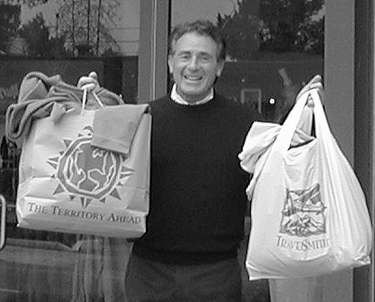Written by Stepheny McGraw
Families had one car, which husband and wife shared. Lou, Roxy's own father, walked from their home on Ross Road to work downtown. Highway 101, just three lanes back then, was known as Blood Alley. Drivers had to turn their lights on to signal that they were passing. People lived in Midtown and shopped here, too. Wives helped their husbands out at the store and everything was closed on Sundays.

Photo by Annette Ashton
Midtown Center had the Golden State Creamery, which pasteurized milk on the premises and the Purity Supreme, with its trademark Quonset hut shape from World War II where Walgreen's is now. Duca and Hanley's was the market then and up until the late 1980's when it morphed into Longs. Back then, Dr. Defeo used to hire kids to pick the apricots in his orchard. He grew pears, too, but he didn't sell them. The first family to have a TV set lived on the corner by Ross and Moreno. They used to rig it up with a big magnifying glass and a color filter to make the picture larger and add color.
Before Safeway, A & W Root Beer was there. Roxy said they used to make the root beer with sassafras. Standard Pipe Factory stood where the Winter Lodge is now and Hoover School occupied the site where the apartments are today, next to Coldwell Banker which itself used to be Cornish and Carey. The first and second grade shared the same classroom. Block parties, progressive dinners, the neighborhood and its families were close. When someone was sick, everyone helped. Sid Worthington taught folk dancing and square dancing and then the Beaudoins began teaching ballroom dancing and cotillion over on Colorado. Lou Rapp coached Little League and passed along to the kids the skills he had mastered as a semi-pro in baseball. He later built furniture for their house on Ross Road, using the skills he learned in Palo Alto Adult Education.
Roxy's dad Lou had Rapps' Shoes in downtown for years. Now, Roxy carries on the family tradition of clothing stores with two new additions to Midtown: The Territory Ahead and Travel Smith, which opened this week at the former KnoWhere site, which itself used to house Bergman's Department Store.
Things change and somehow they still stay much the same.